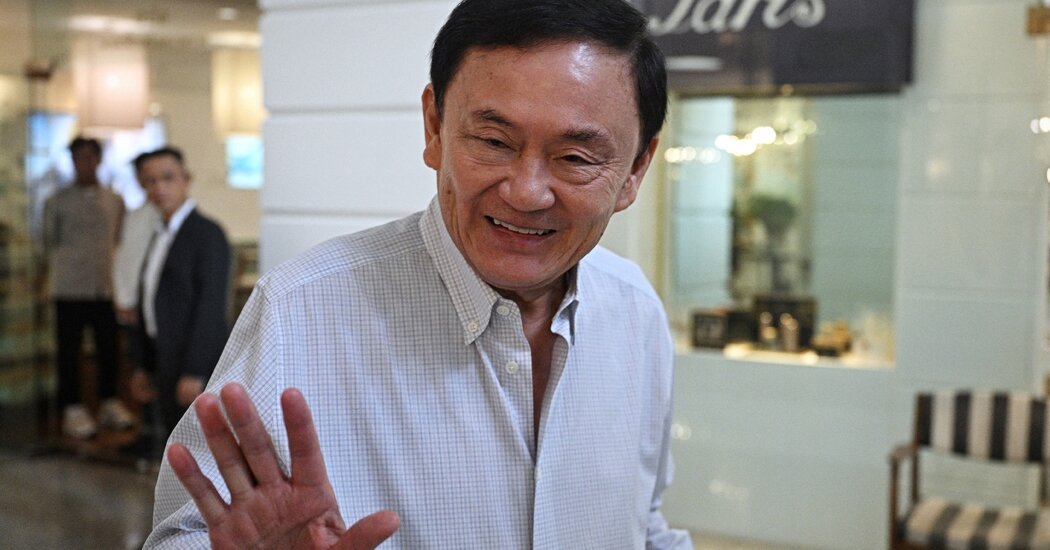Thaksin Shinawatra, a former prime minister of Thailand who is also a powerful behind-the-scenes player in the current government, was indicted on Tuesday on a criminal charge of insulting the monarchy, ushering in a period of uncertainty that could plunge the country into a political crisis.
Mr. Thaksin is the most high-profile figure to be charged with violating the royal defamation law, which is one of the world’s harshest. He posted bail of about $14,000, according to Thailand’s court of justice, but the case could drag on for months.
The indictment was the latest sign of Thailand’s royalist-military establishment exerting its will. It allowed Mr. Thaksin to enter the country last year after 15 years of self-exile and effectively partnered with him — a longtime opponent — to prevent a new challenger from rising to power. Now, analysts say, it has used the threat of legal action against Mr. Thaksin, 74, to keep a check on his political ambitions.
Although Mr. Thaksin does not have a formal position in the current government, he is widely regarded to have powerful influence over the governing coalition, which is led by his political party, the Pheu Thai Party. Many of his allies have cabinet appointments.
The current prime minister, Srettha Thavisin, who is an ally of Mr. Thaksin’s, is also facing legal challenges that could leave him suspended from office. He is accused of running afoul of the constitution by appointing a lawyer with a criminal conviction to his cabinet. Mr. Srettha’s case was heard on Tuesday in the Constitutional Court.
That court is also hearing a petition to disband the opposition Move Forward Party, which won the top spot in last year’s election but was blocked from forming a government. In January, the court found the party guilty of breaching the constitution over its campaign to weaken the royal defamation law.
The cases are a reminder of who controls the levers of power in Thailand. The country has long been dominated by a royalist-military establishment that has used the justice system or the armed forces to crush any challengers.
The accusations against Mr. Thaksin stem from an interview that he gave to a South Korean newspaper, Chosun Ilbo, nine years ago, during which he said that the king’s top advisory body, the privy council, helped engineer a coup in 2014. He is also charged with entering into a computer system information that was deemed a threat to national security. Mr. Thaksin pleaded not guilty to all charges, his lawyer, Winyat Chatmontree, told reporters.
Mr. Thaksin’s passport was confiscated by the authorities, and he is now barred from traveling abroad, Mr. Winyat said.
Mr. Thaksin has long been the old guard’s boogeyman. A charismatic telecom billionaire, his populist policies galvanized voters in the rural north. Mr. Thaksin was ousted in 2006 after about five years in office, and his “red shirt” supporters clashed with the anti-Thaksin “yellow shirt” faction made up of royalists and the urban elite in the streets of Bangkok for much of the 2000s.
Mr. Thaksin fled the country after his ouster but remained influential while he lived in Dubai and London. The political parties he founded consistently won the most votes in every election — except last year when the progressive Move Forward Party clinched a surprise victory.
Last year, Mr. Thaksin made a dramatic return to Thailand in what many saw as part of a deal with his former opponents in the old guard to keep Move Forward out of power.
Although he was sentenced to eight years in prison on charges of corruption and abuse of power when he returned to Bangkok, he never had to serve a day in jail. Soon after his return, the king commuted his sentence to one year. In February, he was released on parole after spending his jail term in a hospital.
It was clear after his return that Mr. Thaksin could not resist staying out of politics. Last month, he held talks with resistance groups in Myanmar, forcing Thailand’s foreign minister to clarify that the discussions were not part of the Thai government’s policy toward its neighbor. He reportedly met with Prime Minister Anwar Ibrahim of Malaysia last month. He has also traveled around the country, courting Thailand’s political bigwigs in an apparent effort to isolate the Move Forward Party in the next elections.
Then, last month, the attorney general announced that he would indict Mr. Thaksin for violating the royal criticism law. The law, which is punishable by three to 15 years in prison, has often been used against activists and, most recently, protesters who demonstrated in Bangkok in 2020.
The political uncertainty in Thailand has rattled investors. Its stock index has fallen roughly 16 percent in the past year and is the world’s worst-performing benchmark over that period, according to Bloomberg.
The original complaint made against Mr. Thaksin was filed in 2015 by Gen. Udomdej Sitabutr, who, at the time, was the deputy defense minister in the military junta that seized power in a coup a year earlier. The authorities issued an arrest warrant for Mr. Thaksin, but he had moved abroad by then.



